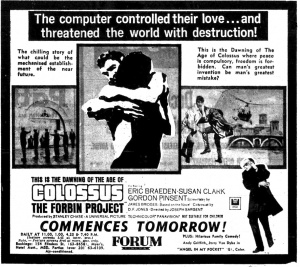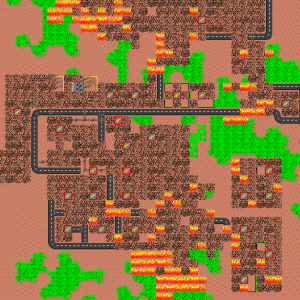Dave Young Graduation Project Proposal Final version 05.12.2012 2012
Tentative Title(s)
Some titles for works, some never to be realised:
Untitled (The Noun of Noun in the Noun of Adjective Noun)MicropalypseA City in a Constant State of CollapseNATO WARSIslandThe Big Red Button- A New Economics of Community and the Land
- Constant Earthquake in Micropolis
- Yet Another Collaborative Editor (Y.A.C.E.)
General Introduction
For my graduate project, I would like to design "cybernetic" interfaces that explore the emergence of hierarchies within socio-political systems.
Over the last year at Piet Zwart, I have written a number of essays that explores how cybernetics has been used to influence the "behaviour" of information during the Cold War - more specifically, how the processes of production, distribution and consumption of information had changed over the course of the 20th century. This research has developed into an interest about how cybernetics has been used to mediate social discourse, and why it is often celebrated as a means to achieve a non-hierarchical, democratic society.
Contrary to cybernetics' promise of homeostasis, I am interested in the idea that a social system is "entropic". Despite our attempts at creating rules and standards (obvious examples being language, laws, government systems) to maintain stability, the level of disorganisation within a given system increases over time. Thus, my main interest is in understanding the circumstances that amount to a "process of failure" within a social system.
I plan to explore these ideas predominantly through the creation of networked interfaces that play with the tensions between collective production and self-interest. I am interested in developing applications that operate between the functionalities of a "tool" and a "game", offering to be a platform for productive collaboration but simultaneously exploitable by one or more individuals in order to completely halt the system's functionality. If successful, my work should reveal the tensions that inevitably arise over time within hyper-democratic systems, commenting on the (im)possibilities of achieving social homeostasis with cybernetic theory.
Relation to previous practice
In my past practice, I was examining the relationship between cybernetic theory and cold war computer technologies, and their resulting impact on popular culture. I wrote two essays while in first year on these topics. In the second essay, I was particularly interested in how computer technologies were represented in the science-fiction cinema, often as a propaganda device that illustrated the technological prowess of the United States over the rest of the world. In the first trimester, I had also investigated how cybernetic theory was reappropriated by the counterculture, removing it from its military/corporate background and using it to create non-hierarchical social systems within the communes in the early 1970s. My current interest is a development of these ideas: firstly, that cybernetics had a large social impact through its representation in cinema and print media during the Cold War, and also to explore the reasons it might be used to influence the behaviour of a group of people.
Another Theory of Play and Fantasy
Earlier in this trimester, I have worked on a number of experiments that have informed the development of my graduate project. I was interested in the game Micropolis (the open source version of Sim City), as it presented a virtual representation of society as a cybernetic entity. In the game, the player is presented with modest starting capital and the challenge to build a profitable city, within which the residents are satisfied and issues such as pollution and crime rate are carefully controlled. The complexity of the simulation is derived from a network of interdependent rules and feedback loops, which the player must manage tightly in order to succeed. Using Micropolis as a model, I developed a workshop which involved a 'committee' of players all trying to work together to build a society. I was interested in how a hierarchy would emerge between the individual players as they were faced with making a number of ideological decisions within the game as a collective.
I have decided to leave this workshop concept aside for the time being, although I am continuing to slowly develop it outside of my official graduate project work. I feel that I need to take some more time to work on how to "frame" the workshop, potentially more as a performance or as a participatory role-playing scenario.
Information about the workshop can be found here and here.
Constant Earthquake in Micropolis
This is a speed project I worked on to disrupt the underlying systems within the game Micropolis. As the title suggests, the game is hacked so that there is a constant earthquake, meaning that any buildings the player tries to construct immediately begin to collapse. It is intended to be a subversive joke on the games mechanics, but also to increase the entropy within the system in order to illustrate how the game is really a battle with maintaining a state of order within a system. The in-game aesthetics of the earthquake is jarring and comedic: the game's open objective of building a utopian capitalist city is rendered impossible. Instead, satisfaction is derived from our fascination with the aesthetics of failure. More information about the project is available here, and a project page for the work is available on my website here.
Relation to a larger context
In a very general sense, my current interests fit in with a long history of sociological discourse engaged with attaining an ideal civil environment through the adherence to a political system. More specifically, my work fits in with the legacy of Cold War cybernetics, and how it is used as a method to manage and control the information within human behaviour. My work is informed by the writings of Deleuze and Guatarri, Roy Ascott, Richard Barbrook, and Norbert Wiener, among others.
In terms of relevant art works, I am interested in systems art from the 1960s/1970s. Works from this period reflect the hype around "open works", cybernetics, and the emergence of the information-based society.
One particularly relevant piece is "Seek", also known as "Blocksworld", by Nicholas Negroponte with Architecture Machine Group M.I.T. The work was shown at Software (1970) at the Jewish Museum in New York, curated by the eminent systems-art theorist Jack Burnham. Physically, the work is a closed environment, inhabited by a population of gerbils and an arrangement of loose blocks. As the gerbils navigate the environment, they disturb the positions of the blocks. A robotic arm monitors the positions of the blocks and arranges them according to their "correct" architecture pre-programmed by Architecture Machine Group. The piece creates a 'closed system' - an entropic environment that is dismantled through the movements of the gerbils who inhabit it. It is a feedback loop: the gerbils knock down the blocks, and the robotic arm repairs the structure to some ideal pre-programmed by the Architecture Machine Group (AMG).
In mid-20th century minimalist music, there is a history of experimentation with systems that explore similar ideas about collective authorship and control. Cornelius Cardew's composition The Great Learning exists as a set of instructions and an incantatory text to be "performed" by a group of untrained vocalists. The Great Learning is inspired by Marxist/Confucian ideology, and involves the creation of a system whose variety actually decreases over the duration of the performance. Extracts from a performance of the composition is available on Ubuweb.
Practical steps
I have decided to focus on the development of an online collaborative writing tool that explores the emergence of productivity and hierarchy in an unstable and dynamic social system. Titled Yet Another Collaborative Editor, the tool enables multiple authors to contribute to a text simultaneously in their browser. Once an author submits a new addition to the text, no other authors can input anything until all connected authors have anonymously voted whether the addition should be kept or not. If they all vote yes, the addition is permanently stored. If one author votes no, the addition is removed, and the process repeats itself.
The interface plays with the idea of hierarchy, presenting the authors with a potentially useful democratic system where all online peers must vote on the most recent addition to the text before they can contribute another addition. The implementation of a binary voting system means that the tool can be used as a productive distributed writing platform, or readily exploited and used subversively by one author to control the others and completely halt productivity. There is no secondary chat system that would enable mediation and discussion surrounding each decision, so a form of consensus would have to emerge out of the group in order for it to remain productive.
This page has more specific information about Yet Another Collaborative Editor.
My plans are to prototype Y.A.C.E. over the coming weeks and to decide the context in which it should be used. I am particularly interested in a suggestion made to me during a tutorial with Thomson and Craighead - that I should invite an organised collective to write a document collaboratively with Y.A.C.E. I hope that by testing it out in various formats I will have a clearer idea of what the project is most suited to, and how my ideas can be extended further for my graduate project.
References
Books
- Barbrook, Richard Imaginary Futures (2005)
- Bateson, Gregory Steps Toward an Ecology of Mind (2000) University of Chicago Press, United States.
- Carey, John The Faber Book of Utopias (1999) Faber and Faber, London.
- Edwards, Paul N. The Closed World: Computers and the Politics of Discourse in Cold War America (1996) MIT Press, United States.
- Galison, Peter The Ontology of the Enemy (1994)
- Poster, Mark and Savat, David (Editors) - Deleuze and New Technology (2009) Edinburgh University Press, UK.
- Rand, Ayn The Fountainhead (2007) Penguin, England.
- Spufford, Francis Red Plenty (2010) Faber and Faber, UK.
- Vossoughian, Nader Otto Neurath: The Language of the Global Polis (2008) NAI Publishers, The Netherlands.
- Wiener, Norbert The Human Use of Human Beings: Cybernetics and Society (1988) Da Capo Press.
Online/Articles
- Beagles, John: In a Class all of their own: The incomprehensiveness of art education, Variant 39/40, accessed 22/09/12
- Becker, Gary and Posner, Richard The Becker-Posner Blog
- Flacy, Mike : Facebook wants you to snitch on friends that aren’t using real names, Digital Trends accessed 23/09/12
- Holmes, Brian: FUTURE MAP: Or, How Cyborgs Learned to Stop Worrying and Love Surveillance (2007), accessed 25-03-12
- Hopkins, Don: HAR 2009 Lightning Talk Transcript: Constructionist Educational Open Source SimCity, accessed 25/09/12
- Huebner, Lee: The Dawn of Politics' TV Era, 60 Years Ago: Nixon and the Checkers Speech, The Atlantic, accessed 22/09/12
- Humdog: Pandora's Vox, repost of 1994 essay, accessed 24/09/12
- Kunkel, Benjamin The Unbearable Lightness of Slavoj Zizek's Communism, accessed 09/10/12
- Madrigal, Alexis: Driverless Cars Would Reshape Automobiles *and* the Transit System, qz.com, accessed 30/09/12
- Soulskill: Decentralized Social Networking — Why It Could Work tech.slashdot.org, accessed 8/10/12
- Tegel, Simeon: Can private cities save a nation with world's worst murder rate? Independent.co.uk, accessed 24/09/12
Filmography
- Class Wargames The Game of War (2011)
- Curtis, Adam All Watched Over by Machines of Loving Grace (2011)
- Curtis, Adam Pandora's Box (1992)
- Gottschau, Jakob, and Hesselager, Ojvind Bringing Life to Space (Turen Gar Til Mars) (2010)



